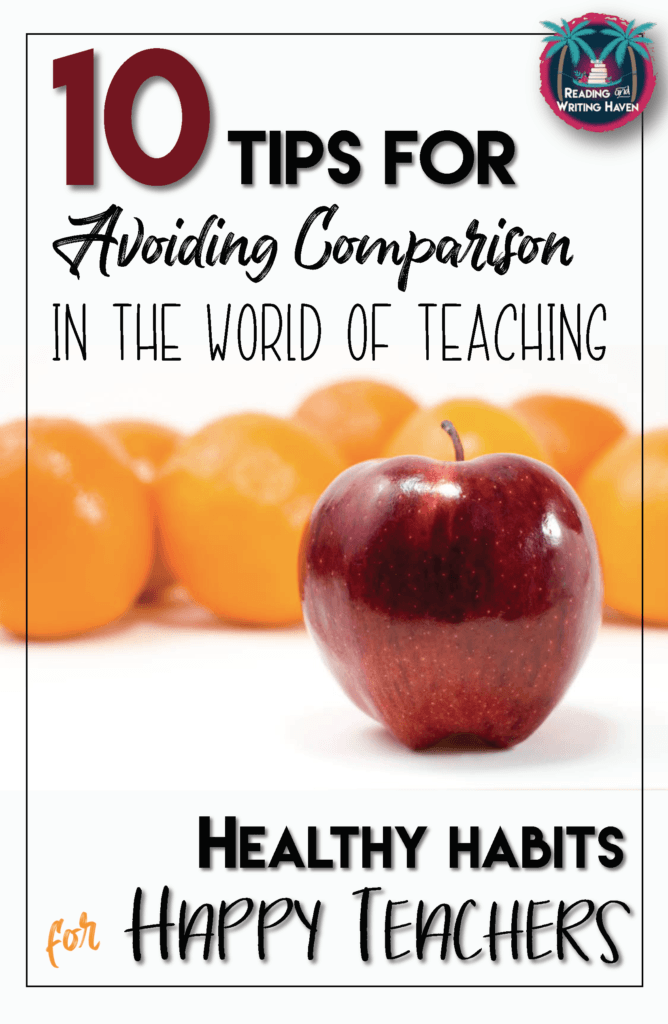How Avoiding Comparisons Can Help You Fight Teacher Burnout
Staying positive by avoiding comparisons is one of the best ways to ward off teacher burnout. It’s not always easy to do so in the midst of a stressful season in our career. We might be tempted to look around, observing what appears to be others’ perfections, and fill our heads with thoughts of inadequacy. In this post, read about ten different ways you can focus on what matters and enjoy the gifts you personally possess as you use them to bless others.
It comes like a thief in the night, stealing our joy and making us question our worth. It consumes like fire, smoldering our love for teaching and deflating our perceptions of our own unique gifts and talents. What is this criminal? The comparison game. While seemingly innocent at first, comparing ourselves to other teachers will only result in feelings of frustration and inadequacy in the long run.
In this world, there’s a lot of pressure on educators. Daily, we push ourselves to the limit of our capabilities, striving to go above and beyond. Sometimes, our efforts are noticed. Many times, however, they are not. Things happen that make us doubt our worth and question our longevity in the field. Perhaps you can identify with some of these scenarios:
- One of your colleagues is given credit or praised for an idea that was originally yours.
- Someone else’s classroom decorations are more “Pinterest-worthy” than yours.
- Your students like other teachers better than you — they’re cooler, trendier, easier, funnier, prettier, etc.
- A colleague wins an award or recognition.
- Many of your teacher friends have a larger social media following than you.
- You’re the least fashionable person on your floor.
The list goes on. This is the world in which we live. Scenarios like these can leave us feeling downright sorry for ourselves if we let them. Negativity is a powerful emotion that can blind us to the truth.
Moving Past the Trap
While it’s tough to avoid, we don’t have to succumb to the pressures of the comparison game. Like many teachers, I’ve struggled with this issue for years. Over time, I’ve learned some extremely helpful ways to deal with these issues before they begin to fester and ultimately lead to teacher burnout. I know I’m not alone in this battle.
My goal? Staying positive (not only for my own health, but also for that of my family, my friends, my colleagues, and my students) so that I can make the biggest impact possible in my current station in life. These are my “go-to” techniques when I feel the beginnings of comparison starting to naw away at my inner peace.
 AVOIDING COMPARISONS: TIPS FOR STAYING POSITIVE
AVOIDING COMPARISONS: TIPS FOR STAYING POSITIVE
Start the day off right.
I always feel better if I start my day off with quiet time. I wake up a little earlier than I need to so that I can sit and think, pray and reflect, and get my priorities straight. Whatever makes you feel calm and confident — start your day that way. Doing this helps put me in the right frame of mind to avoid the traps of comparison.
Surround yourself with friends who will build you up.
When I begin to doubt myself, I have a couple different close friends who I contact immediately. I share my concerns, knowing that what I tell them is confidential. These people are adept at pointing out my strengths and helping me to find perspective in the middle of a frustrating time in which I am failing to grasp my own abilities in light of others’ strengths.
Write.
If I feel like what I do doesn’t matter, writing about it helps me to refocus my thoughts and energy. Even if I don’t want to talk to someone about it, jotting it down on paper is therapeutic. It helps me to purge icky thoughts from my mind.
Adopt a mantra.
When negative notions begin swirling freely as they tend to do, I tell myself, No. I’m not thinking about that. Then, I replace those negative thoughts with a mantra. You do you. Finally, it’s important for me to purposefully redirect my attention to something else lest I fall back into the same trap of pessimism. A simple mantra can be the key to easily casting away unwanted thoughts.
Keep an encouragement collection handy.
When I first began teaching, one of my mentors told me to keep all positive communication, notes of thankfulness, and other accolades in a location where it would be easy to access them. That advice was invaluable. Now, when I begin to doubt my worth in light of the current stresses of my work situation, I can go to that folder, re-read the notes of inspiration, and remember why I went into teaching in the first place.

Focus on your strengths.
It’s hard to be good at everything, and it’s even harder to be the best at everything. When I feel myself falling into a pattern of comparison, it helps to remind myself of my own gifts and talents. They might be really good at infusing pop culture into their lesson plans, but I am talented at adding a dose of humor to dry subjects, like grammar, for instance.
Think about your passion.
Sometimes the comparison game emerges when we are not passionate about a certain aspect of teaching. For instance, if you don’t enjoy technology, it can be very easy to compare yourself to a fellow grade-level teacher who is the building guru for infusing technology into curriculum.
So. Don’t think about that! Why waste the time? Instead, focus on what makes you passionate. I could talk for hours about differentiating instruction. If I channel my thoughts and energy toward my own areas of interest, I can teach for years. If I dwell on the areas of weakness, pessimism sets in and permeates the room, like a wet dog smell contaminating a brand new carpet.
Do one thing.
When I’m feeling especially disgusted with myself, I’ve found it beneficial to choose one area I want to improve upon. Realistically, we are our own worst critics, and while everything might seem to be awful in the moment, simply choosing one aspect of our job to work on will help us to feel like we are making progress. Progress feels good. Stagnation? Not so much.
Engage in professional development.
I’m the most confident in my teaching abilities when I’m in the midst of professional development. Taking graduate level classes, obtaining a certification, or even reading a book on practices or research-based approaches gives me motivation to stay on top of the ever-evolving world of teaching. Knowing I have something new to add to my repertoire increases my feelings of productivity and success. In turn, it reduces my tendency to think I’m less valuable than my co-workers.
Detox.
Many of the avenues for comparison originate on social media or email. When I’m feeling stressed or insufficient, a digital detox helps to cleanse my attitude and my mindset. Stepping away from the constant stream of drama and false perfection can do wonders for our mood.
In the end, avoiding the temptation to compare ourselves to others will make us better teachers. When we channel our thoughts, words, and actions in a positive way toward our curriculum, instruction, and relationships, everyone wins.
